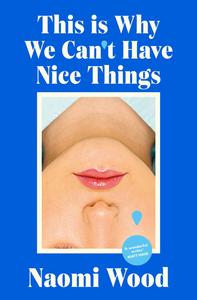
|
|
| Naomi Wood (photo: Christa Holka) |
|
Acclaimed British author Naomi Wood has written three novels: The Godless Boys, Mrs Hemingway, and The Hiding Game. Her books have won the British Library Hay Prize and been shortlisted for the Dylan Thomas Prize. Wood is an associate professor of creative writing at the University of East Anglia.
This Is Why We Can't Have Nice Things (Mariner; reviewed in this issue) is her collection of nine short stories focused on contemporary motherhood and its impact on identity, relationships, and the modern workplace.
Many of the stories in This Is Why We Can't Have Nice Things came together during the Covid-19 pandemic. Did lockdown restrictions affect your ability to conduct research or impact your writing process?
When lockdown hit in the U.K. in 2020, I was ready for a new project. Traditionally I have written historical novels (Mrs Hemingway, The Hiding Game), which used a lot of archival resources and some international travel, but suddenly all that was completely kyboshed. I was also under house-arrest with a toddler and a baby, and my partner and I had jobs and 24/7 childcare, but I knew if I didn't write I would definitely go bananas. Short stories seemed the only actual feasible form in which I could make fast progress in tiny increments of an hour or two here and there. I had tried writing short stories in the past but hadn't got far with them; I think it took three novels as an apprenticeship to the more finicky craft of the short story.
Are any of your characters inspired by people you know?
There are little snippets from other people, or maybe things I've heard on the school run--that type of thing--or anecdotes that friends have told me that I've integrated into the stories. Mostly, though, the stories are inspired by little moments in my life: I attended a corporate therapy sessions for returning mothers (didn't assault the counselor, though, well done me), the relationship of "A/A/A/A," and the domestic descriptions of a family during lockdown were all culled from my experience.
 Do you see yourself in any of the mothers in your collection? Is there a story you most relate to?
Do you see yourself in any of the mothers in your collection? Is there a story you most relate to?
Oh absolutely. After three books, this is probably my most personal; I think it takes ages to develop the craft of writing about yourself. My favorite is probably "Comorbidities," which won the BBC National Short Story Award last year. I think it does a good job of capturing a 21st-century centrifugal anxiety doom-spiral--climate change, parenting with the Internet, the deathiness in many things--but it's also about a couple just really trying their damn best to keep things alive in the bedroom too, via a sex tape or two.
You've mentioned how the "performative positivity of others" in reaction to your pregnancies bothered you. Can you elaborate on that?
After I had my first baby I was really confused why there were some women who were lying (maybe this is too strong, but stay with me) about how 100% knock-out in love they were with the whole experience. That caused me to then be "performatively negative"--like I pretended to have this whole cool negligence to my motherhood style, i.e., "Where's the baby?" "Oh, I don't know, playing with the hair straighteners?" That kind of thing. Once I was out of that soup of hormones in the first year, I realized my "approach" was as much an affectation as the performative positivity from the more sentimental mothers around me. But it also started me thinking about how I wanted to write about mothers, and parents in general, who actually fast-cycle through many emotions--love, frustration, anger, regret, then back to joy and satisfaction and back again--maybe a hundred times a day. That parenthood is complex, rather than a binary of rose and thorns.
How do you balance the maternal need to protect your children with the realization that parents simply have no control over certain aspects of their children's lives?
Lol, I do not think I have any balance in this matter and the fact that I have no control over certain aspects of my children's lives is landing as a surprise to me.
As a writer, what interests you about women who wield power over, or oppress, other women?
After the protests of BLM during the summer of 2020, I learned a phrase which was applied to white women about the difficulty of "relinquishing victimhood." It made me think about how the victim can be the persecutor; that a white woman oppressed by a male boss, say, could then oppress a Black woman, and how one state of victimhood shouldn't blind us to the possibility that we are also the persecutor to someone else. In some of the stories, for example "Hurt Feelings," the female boss has suffered from decades of mistreatment and, as a result, squeezes the life out of her (pregnant) female junior who she thinks is over-sensitive. Women oppressing other women is just so interesting to me. So many of my relationships are with women, both in the workplace and in my personal life, so of course this type of thing is going to happen, and it would feel false not to write about how we can be both victim and persecutor. We are all capable of it.
Some of the mothers in your stories suffer from what you refer to as "over-resilience." What is it about modern Western society that women often feel pressured into doing too much?
I think a lot of women suffer from over-resilience. All my female friends, whether they have kids or not, are so tough, so efficient, so used to having 8,000 plates spinning and not dropping one. All the tiny extra things which really add up. But nothing really changes because women are so expert in carrying on, and they develop this amazing, and kind of depressing, over-resilience, like in the story "Peek-a-Boo," where the protagonist, Ani, cares for her drunk dad, her movie star boss, her twin, her new baby--even rejecting a possible boyfriend because she only sees a future with him as more labor. I guess the provenance of this problem is complex, but it's almost certainly made worse by the false peddling of perfect lives on social media. --Shahina Piyarali

